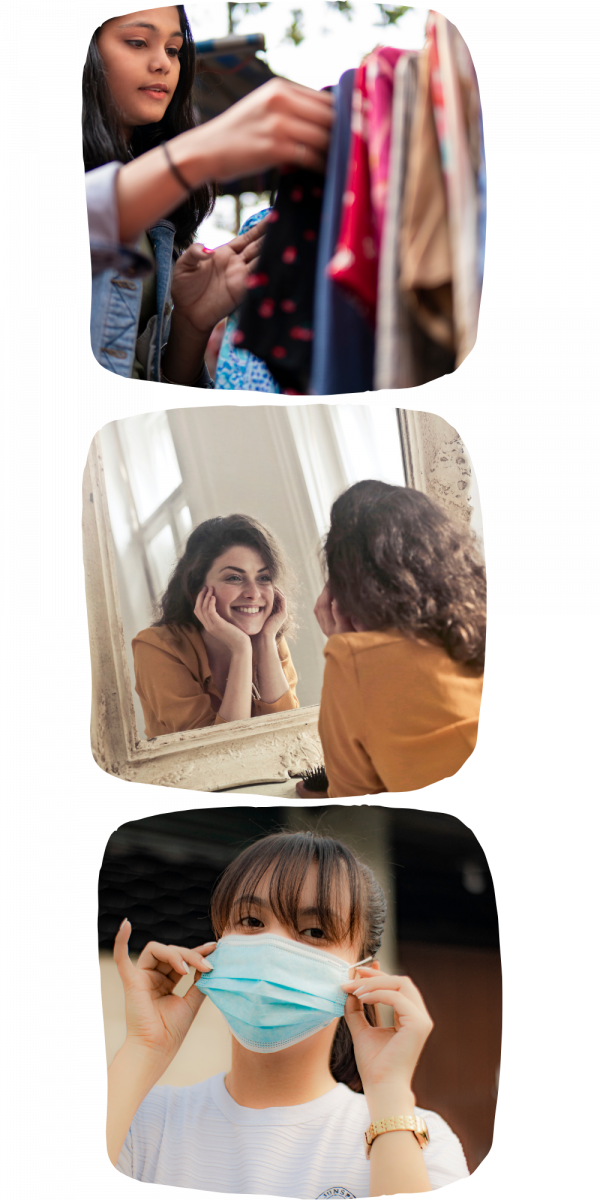 Challenge: While tweens and teens may often feel uncomfortable in their changing bodies, such growing pains have been heightened for many youths by the disruptions of the Covid-19 pandemic. As some places lift mask mandates in schools, tweens and teens are invited to show their mask-free faces to the world – or at least their peer group – for the first time in years. Globally, youth have expressed anxiety, embarrassment, and fear of rejection when faced with the prospect of unmasking around their peers – so much so that a new term, “mask fishing,” has bubbled up in Gen-Z circles to put a name to these concerns. Now, more than ever, tweens and teens need a foundation of self-acceptance to feel Secure & Calm within themselves so that they can be Alert & Engaged within their social worlds. As a philosophy, movement, and lens of self-perception, body neutrality offers great promise as this foundation.
Challenge: While tweens and teens may often feel uncomfortable in their changing bodies, such growing pains have been heightened for many youths by the disruptions of the Covid-19 pandemic. As some places lift mask mandates in schools, tweens and teens are invited to show their mask-free faces to the world – or at least their peer group – for the first time in years. Globally, youth have expressed anxiety, embarrassment, and fear of rejection when faced with the prospect of unmasking around their peers – so much so that a new term, “mask fishing,” has bubbled up in Gen-Z circles to put a name to these concerns. Now, more than ever, tweens and teens need a foundation of self-acceptance to feel Secure & Calm within themselves so that they can be Alert & Engaged within their social worlds. As a philosophy, movement, and lens of self-perception, body neutrality offers great promise as this foundation.
Why it matters: Body image affects self-confidence, physical and mental health, and our ability to feel at ease in social situations. In adolescence, feeling good about oneself is important for developing healthy relationships and pursuing academic and extracurricular goals. Teens and tweens who struggle with anxiety, depression, or eating disorders may be more likely to fixate on perceived flaws or feel badly about their bodies overall, and may especially benefit from a body-neutral approach.
Solution: Body neutrality offers a functional perspective on our bodies, which creates space to appreciate them for what they can do, rather than what they look like. Body neutrality is different from body positivity, which encourages people to like or love how their bodies look. Body neutrality shifts the focus away from appearance and towards function, which may be particularly beneficial for youth who struggle with eating disorders, body dysmorphia, or other mental health challenges.
How to do it: Just as negative thoughts and feelings about one’s body don’t develop overnight, building a body-neutral perspective takes time. The following activities and tips aim to help adults support tweens and teens to develop acceptance and appreciation towards their bodies. These suggestions are not a replacement for medical advice – if you are concerned that a young person may be at risk of harming themselves or of experiencing a medically serious condition such as an eating disorder, please consult immediately with a medical professional. Further information on supporting tweens and teens with eating disorders in British Columbia can be found here. Information on supporting youth with mental health challenges in British Columbia can be found here.

1. Practice food neutrality. Talk matter-of-factly about food as fuel for our bodies. There are no good or bad foods - just different types of nourishment that help our bodies accomplish different things. Avoid talking about "junk food" and "health food," and banish the food police from your home or classroom!
2. Follow the division of responsibility in feeding. Serve your tween or teen regular meals and snacks when they're at home, and ensure that a variety of nourishing food is available to them when on the go. Avoid pressuring them to eat more, less, or different types of food. By honoring their ability to feed themselves, you are letting them know that they can trust their body's hunger cues and cravings.
3. Be present while eating. Support your tweens and teens to eat well for energy and satisfaction by removing distractions from meal and snack times. Eat together at the table, when possible, without phones or TV in the way. Model eating at a relaxed pace and savoring eating times as a space for rest, connection, and tuning into body and mind. Try a mindful eating meditation together to practice eating with presence.

4. Talk about bodies functionally. Reframe appearance-focused body talk by emphasizing what your body can do. Interrupt youths' negative self-talk with neutral statements that focus on their body's functional strenghts - such as legs that can take them up mountains on weekend hikes, arms that can help carry the groceries in from the car, or a digestive system that processes their favourite foods with ease.
5. Practice body awareness. Try a body-scan meditation that trains the mind to notice sensations felt thorughout the body without judgement. Sometimes, for body-sensitive teens, normal feelings such as fullness after a meal can trigger negative body-image related thoughts. In these moments, return to the body-scan exercise as a reminder that our bodies can feel many sensations at any given moment, and that we can choose which ones we focus on.
6. Move to feel good. Emphasize that while exercise has many benefits, the main reason we move is to feel good in the moment. Help your tween or teen choose to move in ways they enjoy and avoid comparisons. Support them to listen to their bodies and honor feelings such as hunger, fatigue, and aches and pains in their movement choices.
 7. Wear clothes that fit. Support your tween or teen to wear clothes that fit comfortably. Bodies grow and change shape rapidly throughout adolescence, so refrain from commenting on how quickly they may outgrow new clothes, and support them in purchasing clothes or obtaining hand-me-downs in sizes that fit their bodies as they are in the present.
7. Wear clothes that fit. Support your tween or teen to wear clothes that fit comfortably. Bodies grow and change shape rapidly throughout adolescence, so refrain from commenting on how quickly they may outgrow new clothes, and support them in purchasing clothes or obtaining hand-me-downs in sizes that fit their bodies as they are in the present.
8. Don't fall through the looking glass. Scrutinizing perceived flaws in one's appearance such as acne, facial asymmetry, or other normal body imperfections can become all-consuming for youth who are uncomfortable in their skin. If you notice this in your tween or teen, encourage them to limit mirorr time and remind them that focusing on perceived flaws can magnify them in our minds. Support them to figure out what feelings underly their drive for self-scrutiny - anxiety can sometimes manifest as a fixation on self-image.
9. Take it slow. Whether tweens and teens are anxious about showing their mask-free faces in school, or shedding layers for gym class, it is important that they work towards body neutrality at a comfortable pace. This might mean keeping a mask on longer than their peers while building body awareness at home, shopping for well-fitting gym clothes with desired coverage, or going on weekend movement excursions to shift the focus to what their body can do. After all, body neutrality, like mindfulness, is a lifelong practice.